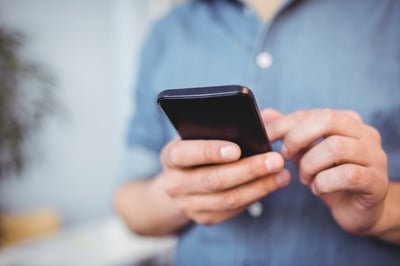Lost Your Phone?
Could that endanger your bank account?

Did you know that over 100 cell phones are lost every single minute in the United States? When cell phones first became insidious in society, there was very little information stored on them. Yes, you had your phone contacts, but there was not much more to glean from a lost phone than your last calls. Today, however, things are different. The advent of smartphones has allowed people to store all of their personal information directly on their phone, but with that convenience comes the potential of information falling into the wrong hands. At some point, you’ve probably had a phone lost or stolen, and you, like most other people who have lost their phone, probably wondered whether or not losing a phone can endanger your financial safety.
Can Losing Your Phone Endanger Your Bank Account?
The simple answer to this question is yes, but it is a bit more complicated than that. Security advisers suggest that smartphones can be secure, but only if the user knows how to use the security features on the phone to ensure their safety. The phone itself is a blank slate, and you, as the owner, have the ability to set permissions and security measures that best fit your needs. While it might seem preferable to keep all your financial data off your phone, it just isn’t possible for many people. After all, being able to check your account balance on the fly, or pay using your phone is incredibly convenient, and, in some cases, necessary for day-to-day life. While there are some inherent risks to having your personal information housed on your phone, there are ways to mitigate the risks and prevent your data from being stolen if your phone goes missing in action.
What Can You Do To Keep Yourself Safe?
Many people fail to use a passcode for their phone, and some even pre-login to banking information on the web. Doing so is akin to leaving your front door wide open when you leave for the day, advise security experts. To best protect your personal data, there are a few things you can do to ensure your safety.
Keep a passcode on your phone: Keeping a passcode on your phone will prevent people from quickly accessing your personal information. iPhone users can even set their phone to wipe all personal data if the wrong password is entered more than ten times. This will prevent unauthorized users from accessing your phone easily.
Do not keep your passwords stored in your browser: Storing your username and password in your browser might seem convenient but doing so can cause serious security risks to your online banking. It is essential to ensure none of your passwords are saved in a browser. If you are using Chrome, you’ll be asked if you’d like to store your password when you enter it for the first time, click no.
Use two-step verification: Two-step verification will ensure your account cannot be logged into on a new device without you being informed. You will need to answer your username and password; then you will be prompted to enter a code sent to either your phone via text or email. Online banking apps, as well as some social media apps, offer this option.
Use apps instead of browsers: Using a banking app, rather than a browser offers added security benefits. You can set up many apps to require your fingerprint for access, or you’ll need to enter your password each time you log in. For security purposes, banking apps generally log you out after 15 minutes of inactivity.
Smartphones have made life easier in so many ways. Today you can connect with people instantly, manage your online banking, and keep your appointments straight directly from a five inch screen in your pocket, but with the convenience comes inherent risks. While a lost or stolen smartphone is a common occurrence, it doesn’t have to be a recipe for identity theft and the misuse of online banking apps as long as you keep your phone secure.
